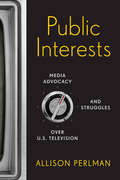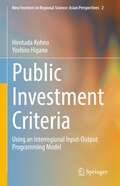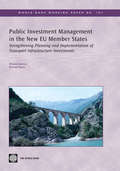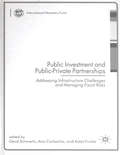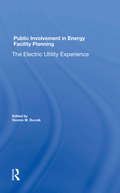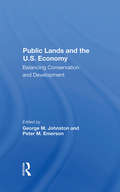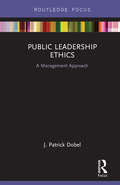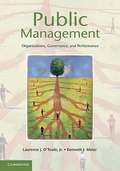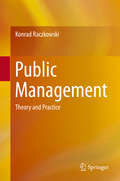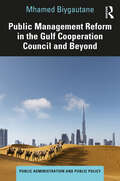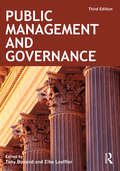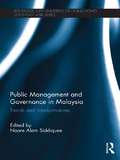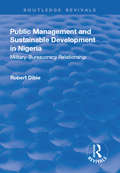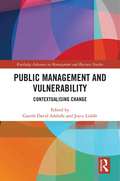- Table View
- List View
Public Interests: Media Advocacy and Struggles over U.S. Television
by Allison PerlmanNearly as soon as television began to enter American homes in the late 1940s, social activists recognized that it was a powerful tool for shaping the nation's views. By targeting broadcast regulations and laws, both liberal and conservative activist groups have sought to influence what America sees on the small screen. Public Interests describes the impressive battles that these media activists fought and charts how they tried to change the face of American television. Allison Perlman looks behind the scenes to track the strategies employed by several key groups of media reformers, from civil rights organizations like the NAACP to conservative groups like the Parents Television Council. While some of these campaigns were designed to improve the representation of certain marginalized groups in television programming, as Perlman reveals, they all strove for more systemic reforms, from early efforts to create educational channels to more recent attempts to preserve a space for Spanish-language broadcasting. Public Interests fills in a key piece of the history of American social reform movements, revealing pressure groups' deep investments in influencing both television programming and broadcasting policy. Vividly illustrating the resilience, flexibility, and diversity of media activist campaigns from the 1950s onward, the book offers valuable lessons that can be applied to current battles over the airwaves.
Public Investment Criteria: Using an Interregional Input-Output Programming Model (New Frontiers in Regional Science: Asian Perspectives #2)
by Hirotada Kohno Yoshiro HiganoThis volume presents the most robust and useful methodology for the derivation of investment criteria for the evaluation and planning of public investment projects – public investment criteria. The methodological approach solves inherent defects of traditional methodology, namely an ad hoc application of the benefit-cost analysis in the static content.Although this approach originated in the water resources development project of the Harvard group, the authors’ methodology has achieved a discrete and dynamic inter regional input-output programming model by which: (i) establishment of priorities among potential investment targets by taking account of economic benefits that are brought by implementation of a set of selected projects, and diffusing into the whole national economy, and (ii) rational allocation of limited public funds to the selected investment projects are consistently made, based on the opportunity cost criteria in the dynamic content. As these benefits make up a source for the stream of further created capital funds for public as well as private sectors over the planning time horizon, optimal re-investment of thus created capital funds are solved recursively in the endogenous model by approaching the turnpike path of the whole national economy. As an optimal solution, the allocated levels for trunk expressway network as well as for other transport facilities, which are balanced with the allocation for industrial capital formation, are obtained by period and by region. In the background of these processes, the imputed price and opportunity costs as a sort of contemporary “god” are always latent.Readers with basic mathematical knowledge will learn functional and practical meaning of the opportunity costs (and the imputed price) in the evaluation and planning of investment. Conquering this small obstacle will be a source of strong self-confidence for society, a worthwhile objective. Other applications of the methodology are also included in this book, which is helpful for practitioners frequently using the feasibility study method as well as experts who wish to understand the theoretical arguments related to public investment criteria. As one of the applications, there is a numerical solution of a composite transport system in which the amounts of roads, railways, and ports are derived quantitatively, not qualitatively. These are results of authentic public investment criteria that are built in the inter-regional input-output programing model.
Public Investment Management in the New EU Member States
by Thomas Laursen Bernard MyersThis paper describes the characteristics of public investment management (PIM) in seven EU countries as it applies to a single sector-transport infrastructure. The report highlights some of the common challenges that four relatively new EU member states-Poland, Slovakia, Slovenia, and Latvia-face as they plan and execute their transport infrastructure projects. It recognizes the importance that EU-mandated processes and procedures have in shaping national systems in the new member states (NMS), but the report finds that actual practices often fall short of EU goals due to capacity constraints, weak institutional structures, and other factors. The experiences of the NMS are compared with those of more developed economies (namely Spain, the UK, and Ireland) to assess whether the later countries have faced similar challenges in managing public investment, and if so, what measures they have adopted to overcome them. This comparative analysis serves to draw out several good practice examples that are relevant for all countries. How those practices are applied in each country is a matter for further study, as each country considers its own political culture and administrative tradition. This paper is a first step toward building dialogue among public finance practitioners in Central and Eastern Europe on how to make public investment projects more effective and efficient over the long term.
Public Investment and Public-Private Partnerships
by Gerd Schwartz Richard Hemming Bernardin AkitobyThere are now increasing concerns about the need to upgrade public infrastructure, improve the delivery of public services, and explore new options for partnering with the private sector. This book looks at& ways of strengthening the efficiency of public investment and managing the fiscal risks of& public-private partnerships.
Public Investment and Public-Private Partnerships: Addressing Infrastructure Challenges and Managing Fiscal Risks
by Gerd Schwartz Ana Corbacho Katja FunkeThere are now increasing concerns about the need to upgrade public infrastructure, improve the delivery of public services, and explore new options for partnering with the private sector. This book looks at& ways of strengthening the efficiency of public investment and managing the fiscal risks of& public-private partnerships.
Public Involvement In Energy Facility Planning: The Electric Utility Experience
by Dennis W DucsikBecause the power industry is anticipating greatly increased generating capacity requirements in the 1990s, political controversy over electricity demand and supply is likely to return to--and perhaps surpass--the level of rancor experienced during the 1970s. Fortunately, a sizable number of utility companies have come to believe that destructive c
Public Justice and the Anthropology of Law
by Ronald Niezen"In this powerful, timely study Ronald Niezen examines the processes by which cultural concepts are conceived and collective rights are defended in international law. Niezen argues that cultivating support on behalf of those experiencing human rights violations often calls for strategic representations of injustice and suffering to distant audiences. The positive impulse behind public responses to political abuse can be found in the satisfaction of justice done. But the fact that oppressed peoples and their supporters from around the world are competing for public attention is actually a profound source of global difference, stemming from differential capacities to appeal to a remote, unknown public. Niezen's discussion of the impact of public opinion on law provides fresh insights into the importance of legally-constructed identity and the changing pathways through which it is being shaped - crucial issues for all those with an interest in anthropology, politics and human rights law"--
Public Knowledge And Environmental Politics In Japan And The United States
by John C Pierce Nicholas P Lovrich Taketsugu Tsurutani Takematsu AbeThis book grows out of the authors' conviction that as public policy issues become suffused with scientific and technical content, they become difficult for the democratic citizens to understand. It attempts to determine mass public capacity and their motivation to respond to the challenges.
Public Lands And The U.s. Economy: Balancing Conservation And Development
by Peter Emerson George M JohnstonCurrent law requires the federal government to fulfill a broad spectrum of responsibilities in managing public lands; to protect and conserve the environment; to foster the appropriate development of marketable commodities; to preserve wilderness areas, wildlife habitats, and unique historical sites; and to encourage public participation in land-use and management decisions. There is no consensus, however, on the best ways to establish a balance among the? priorities when serious conflicts arise. This book presents a wide-ranging discussion of the means by which lands and resources administered by the Forest Service and the Bureau of Land Management can better serve present and future needs for environmental preservation and resource development. The contributors consider public and private interests in the federal lands in light of political realities and uncertainties, giving particular: attention to efficiency-versus-equity issues, privatization fair market value, and the income-producing potential of publicly owned assets. Major sections of the book focus on timber, nonfuel minerals, rangelands, and energy resources. Based on a recent conference sponsored by The Wilderness Society, the book reflects the views of conservationists, scholars, industry representatives, and state and federal officials.
Public Lands and Political Meaning: Ranchers, the Government, and the Property Between Them
by Karen R. MerrillThe history behind the recurring "sagebrush rebellions" in the American West, showing how (before environmentalists entered the fray) ranchers and the feds struggled over the uses of public lands, from the days when ranchers wanted more government support to the virulent anti-federal position that remains.
Public Leadership Ethics: A Management Approach
by J. Patrick DobelDesigned to help midlevel and senior managers in organizations dedicated to public purposes, this book provides trained self-awareness to deploy values to guide decisions and build the culture of their organizations. The book explores how all managing involves leading and identifies the levels of ethical responsibility for managerial leaders. Highlighting the fundamental role that ethics plays in organizational life, J. Patrick Dobel uses insights from cognitive and social psychology to discuss how to anticipate and address threats to integrity and value informed decision making. Building on traditional ethical theory and modern research, the book begins with the fundamental assumption that individuals possess responsibility when they act for ethical purposes and results in taking a position within a public or nonprofit organization. This assumption of responsibility recognizes the inherent discretion in all positions and claims that effective ethical management requires self-awareness, self-mastery, integrity and a working frame of one’s values and character. The book pays special attention to the challenges of integrating diverse people and perspectives in public organizations as well as attending to the slippages to integrity in organizational life and how managers and leaders can foresee and address ethical slippage and corruption. The book provides checklists and decision frameworks that individuals can adopt and deploy to guide decisions. Public Leadership Ethics: A Management Approach will help create strong value informed cultures supported by communication, transparency, incentives and strong management cadres to achieve high quality service and integrity based actions. It will be of special interest to managerial leaders in public service and teaching in public administration and policy programs or executive training.
Public Libraries and Marxism
by John Pateman Joe PatemanPublic Libraries and Marxism provides a Marxist analytical framework for understanding public libraries and presents a set of proposals for transforming the capitalist libraries of today. Evaluating the strengths and weaknesses of this Marxist framework, the authors also provide a critical examination of the history, theory and practice of libraries in the Soviet Union and North Korea. Considering what a Marxist library service would look like in the Western capitalist countries of today, Pateman and Pateman synthesise the insights provided throughout the book into a set of Marxist proposals designed to promote the transformation of contemporary Western public librarianship. These proposals suggest how Western public libraries can change their organisation and practices – their strategies, structures, systems and culture – in order to best serve those with the most needs, particularly as society evolves in response to new challenges. Public Libraries and Marxism will be relevant for scholars and students of library and information science, history, politics and sociology. Outlining the rudiments of a Marxist library service that should be applicable around the world, the book will also appeal to library practitioners who want to develop libraries in a community-led and needs-based direction.
Public Man, Private Woman: Women in Social and Political Thought - Second Edition
by Jean Bethke ElshtainFocusing on the Western philosophical tradition and the work of contemporary feminists, Jean Elshtain explores the general tendency to assert the primacy of the public world—the political sphere dominated by men—and to denigrate the private world—the familial sphere dominated by women. She offers her own positive reconstruction of the public and the private in a feminist theory that reaffirms the importance of the family and envisions an "ethical polity."
Public Management
by Kenneth J. Meier Laurence J. O'Toole JrHow effective are public managers as they seek to influence how public organizations deliver policy results? How, and how much, is management related to the performance of public programs? What aspects of management can be distinguished? Can their separable contributions to performance be estimated? The fate of public policies in today's world lies in the hands of public organizations, which in turn are often intertwined with others in latticed patterns of governance. Collectively, these organizations are expected to generate performance in terms of policy outputs and outcomes. In this book, two award-winning researchers investigate the effectiveness of management in the public sector. Firstly, they develop a systematic theory on how effective public managers are in shaping policy results. The rest of the book then tests this theory against a wide range of evidence, including a data set of 1,000 public organizations.
Public Management
by Laurence J. O'Toole Jr. Kenneth J. MeierOffering much more than a purely theoretical or retrospective view of public management, this exciting text is an invaluable new addition to the field of public management. Putting the American model in perspective, it establishes the historical, theoretical, analytical, practical and future foundations for the comparative study of public management. Taking a boldly integrative approach, Laurence E. Lynn Jr. combines topics of best practice, performance, accountability and rule of law to provide a much-needed umbrella view of the topic. Well-written and illustrated with case study examples, this is one of the most exciting books on public management available today. As such it is an essential read for every student of public management, administration and public policy.
Public Management
by Konrad RaczkowskiPublic management is undoubtedly an acknowledged area of management science, but with meager empirical research. This book takes this challenge and presents a rare analysis of public management from the perspective of 12 Prime Ministers of Poland who governed between 1989 and 2014. The author features the concepts, practice and challenges of public management by making use of direct interviews with the Prime Ministers according to the classical management functions of planning, organization, direction and controlling. The book also presents a theoretical inquiry which redefines public management by breaking away from the traditional paradigm of public management, and introducing a 'mega-organizational' understanding of the state within new institutional economics.
Public Management Reform in Turkey: The Impact of Europeanization and Beyond (Public Administration, Governance and Globalization #20)
by Fatih DemirThis book discusses the Europeanization of Turkish public administration since the early 2000s, offering an analysis of the transformation and basic features and problems of Turkish public administration in relation to the EU accession process.The book consists of six chapters and a conclusion. The first chapter sets the stage by evaluating the public administration reforms in Turkey from the perspective of Europeanization and the European Administrative Space (EAS). The second chapter discusses the administrative procedures based on the European Union’s Charter of Fundamental Rights, and explains the EU’s relationship with accountable government and democracy. The third and fourth chapters examine the steps taken to improve civic participation in decision-making processes, and assess local governance reforms in Turkey with reference to Europeanization processes and the “policy windows” approach developed by Kingdon. The next chapter addresses regionalization in Europe and its parallels in Turkey, especially in the context of the foundation of regional development agencies. Lastly, the book presents the reactions to the fragmentation of government envisaged by New Public Management (NPM) reforms and describes practices beyond fashioning an integrated administration. It also explores the transformation of the executive organ in terms of its change in status, in relation to other centers of political power. The conclusion provides an overview of the apparent oscillation of Turkish public administration in the 21st century, in terms of Europeanization processes.This book is useful for academics studying public administration, public management reforms, Turkish politics, and the European Union, as well as government and diplomatic professionals in Turkey and the EU, especially those dealing with enlargement issues.
Public Management Reform in the Gulf Cooperation Council and Beyond (Public Administration and Public Policy)
by Mhamed BiygautaneThis book offers an understanding of the current state of public management in the Gulf Cooperation Council (GCC) region, highlighting the region's institutional and human capital constraints. Drawing on case studies from GCC states and beyond, the book provides a policy-oriented analysis of these challenges and a set of recommendations on how to address them. Public Management Reform in the Gulf Cooperation Council and Beyond utilizes several theoretical frameworks to explore three themes: first, how the quality of government and efficiency of its bureaucratic machinery can offer a business-friendly environment for the private sector; second, how public-private partnerships can foster stronger collaboration and exchange of knowledge and expertise between the public and private sectors; and finally, how the existing human capital constraints may be addressed through the effective implementation of talent management, knowledge management, and training programs. A comparative approach is taken throughout the book, contrasting the performance of GCC states with other Middle East and North Africa (MENA) countries or the Organization for Economic Cooperation and Development (OECD) member countries in key governance, public sector performance, and business competitiveness indicators to identify what the GCC states need to do to enhance the quality of government and the capacity to deliver services more efficiently. This book will appeal to academics, practitioners, policymakers and private sector consultants, as well as those interested more broadly in the Middle East and the Gulf region.
Public Management and Governance
by Elke Loeffler Tony BovairdPublic Management and Governance examines the factors which make government critically important and the barriers which often stop it being effective. It questions what it means to have effective policies, efficient management and good quality public services, and it explores how the process of governing could be improved. Key themes include: the challenges and pressures facing governments around the world; the changing role of the public sector in a 'mixed economy' of provision; governance issues such as ethics, equalities, transparency and citizen engagement. This revised and updated third edition includes eight new chapters which provide in-depth coverage of key new aspects of public management and governance. It also features a wide selection of international case studies and illuminating examples of how public policy, management and governance can be improved - and what happens when they fail. Each chapter is supplemented with discussion questions, group and individual exercises, case studies and recommendations on further reading. Public Management and Governance is one of the leading student textbooks in its field, featuring contributions from top international authors and covering a wide range of key topics in depth. It is an essential resource for all students on undergraduate and postgraduate courses in public management, public administration, government and public policy.
Public Management and Governance
by Tony Bovaird and Elke LoefflerPublic Management and Governance is the leading text in international public management and governance and an ideal introduction to all aspects of this field. It combines rigorous insight from pre-eminent scholars around the world with a clear structure and supportive, thoughtful, and intuitive pedagogy. This revised and updated fourth edition responds to the significant changes in the external environment, as well as the field itself. It includes six new chapters covering aspects of increasing importance: Public management and governance developments in non-OECD countries Risk and resilience Innovation in public management and governance Digital public management Digital public governance Behavioural approaches to public policy Throughout the new edition, there is a wealth of new content on emergent topics such as collaborative leadership, diversity and inclusion, complexity theory and evidence-informed policy. Each chapter is supplemented with discussion questions, group and individual exercises, case studies and recommendations on further reading; this edition also includes more international cases. This highly respected text is an essential resource for all students on undergraduate and postgraduate courses in public management, public administration, government, and public policy as well as for policymakers and practitioners seeking an up-to-date guide to the field.
Public Management and Governance in Malaysia: Trends and Transformations (Routledge/City University of Hong Kong Southeast Asia Series)
by Noore Alam SiddiqueeThe past two and a half decades have seen major transformations in public sector management and governance across the globe. This book examines the ways public sector management and governance in Malaysia has changed and is changing under contemporary reform models. Chapters are written by well-established scholars and academics with intimate knowledge in their respective fields, and provide a thorough and insightful analysis of the reform trends and developments on a range of topics. These include performance management, compensation reforms, public budgeting, accounting and reporting, privatisation and public-private partnership, e-government, managing ethics and accountability, local government and inter-governmental relations. While the book surveys the topics that are central to public sector management and governance, it also focuses on the nature of reforms and changes that were introduced, as well as the forces that have shaped their design and implementation process, and the initial impacts and results. Overall, the book provides students and scholars of Politics and Southeast Asian Studies with a greater appreciation and deeper understanding of the recent developments and current trends of public sector management.
Public Management and Performance
by Richard M. Walker George A. Boyne Gene A. BrewerPublic services touch the majority of people in advanced and developing economies on a daily basis: children require schooling, the elderly need personal care and assistance, rubbish needs collecting, water must be safe to drink and the streets need policing. In short, there is practically no area of our lives that isn't touched in some way by public services. As such, knowledge about strategies to improve their performance is central to the good of society. In this book, a group of leading scholars examine some of the most pressing issues in public administration, political science and public policy by undertaking a systematic review of the research literature on public management and the performance of public agencies. It is an important resource for public management researchers, policy-makers and practitioners who wish to understand the current state of the field and the challenges that lie ahead.
Public Management and Sustainable Development in Nigeria: Military–Bureaucracy Relationship
by Robert DibieThis title was first published in 2003. How was public policy and economic development in Nigeria affected under the period of military control between 1966 and 1999? What is the nature and scale of change that Nigeria will have to undergo in order to achieve its current development goals? Initially providing a history of Nigeria along with a framework for understanding the nature, scope and magnitude of the military and public management problems within the country, this timely and rewarding book addresses both of these questions. It analyzes the institutions that make and implement public policy in the Nigerian political arena, and examines the route that Nigeria could take in order to enhance its public management capacities. Although the specific focus is on Nigeria, the mode of analysis used is transferable to a wide variety of developing nations. The book will foster an understanding among scholars, development planners, military officers and policy makers of the tasks and challenges facing Nigeria and many sub-Saharan African nations in the twenty-first century.
Public Management and Vulnerability: Contextualising Change (Routledge Advances in Management and Business Studies)
by Gareth David AddidleThis book locates the issue of ‘vulnerability’ in an international context, within public-sector reform processes, and goes beyond the conceptualization of existing concepts of policing and vulnerability to include multi- and intra-agency working. It uncovers many competing and contradictory conceptualisations of the phenomenon and shows how a variety of agencies in different jurisdictions prioritise and operationalise this escalating 21st-century social problem. Two recurring themes of this edited collection are the ways in which non-state organisations and agencies have become an acknowledged feature of modern service delivery, and how the withdrawal of the state has heralded a perceptive shift from collective or community provision towards the stigmatization of individuals. Increasingly, public service professionals and ‘street level bureaucrats’ work in collaboration with non-state agents to attempt to ameliorate vulnerability. Chapter contributions were deliberately drawn from combinatory empirical, theoretical, policy and practice fields, and diverse academic and policy/professional authors. Editors and authors deliberately cast their nets widely to provide integrative scholarship, and contributions from international perspectives to confirm the complexity; and how socio/cultural, political and historic antecedents shape the definitions and responses to vulnerability. This collection will appeal to academics, policy makers and practitioners in a wide variety of disciplines, such as public management and leadership, criminology, policing, social policy, social work, and business management, and any others with an interest in or responsibility for dealing with the issue of vulnerability.
Public Management and the Rule of Law
by Julia BeckettFilled with practical tools and guidelines, this book addresses an essential competence for public managers - incorporating governance and law in public administration. It links democratic constitutional values to administrative decision making and practices by stressing how public law authorizes, informs, and democratically constrains public servants in fulfilling public policies. The author addresses important aspects of governance in chapters that discuss democratic values of the rule of law, constitutional law, legislation and policy, administrative law, judicial practice, contract law, and tort law. The book also considers the practical aspects of public management (such as tax collection, benefits administration, personnel administration, and more), with application guidelines and techniques based on thorough legal grounding.
